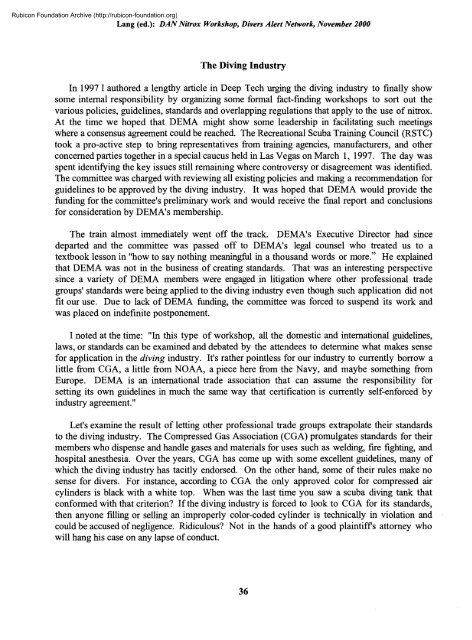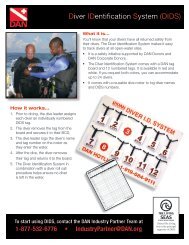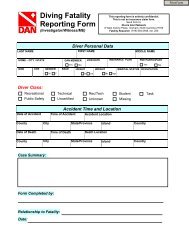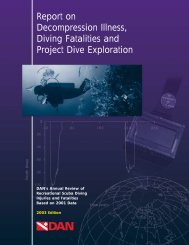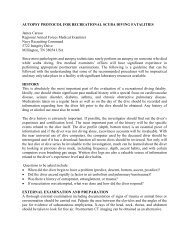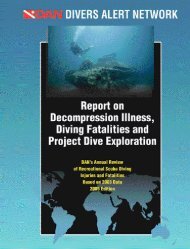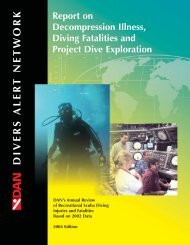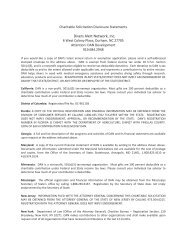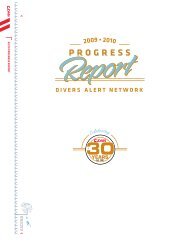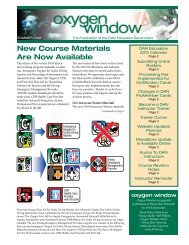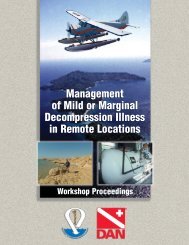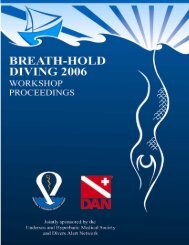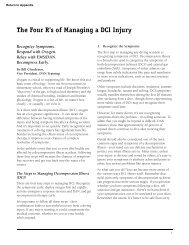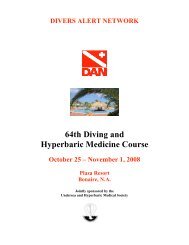Nitrox workshop dings - Divers Alert Network
Nitrox workshop dings - Divers Alert Network
Nitrox workshop dings - Divers Alert Network
Create successful ePaper yourself
Turn your PDF publications into a flip-book with our unique Google optimized e-Paper software.
Rubicon Foundation Archive (http://rubicon-foundation.org)Lang (ed.): DAN <strong>Nitrox</strong> Workshop, <strong>Divers</strong> <strong>Alert</strong> <strong>Network</strong>, November 2000The Diving IndustryIn 1997 I authored a lengthy article in Deep Tech urging the diving industry to finally showsome internal responsibility by organizing some formal fact-finding <strong>workshop</strong>s to sort out thevarious policies, guidelines, standards and overlapping regulations that apply to the use of nitrox.At the time we hoped that DEMA might show some leadership in facilitating such meetingswhere a consensus agreement could be reached. The Recreational Scuba Training Council (RSTC)took a pro-active step to bring representatives from training agencies, manufacturers, and otherconcerned parties together in a special caucus held in Las Vegas on March 1, 1997. The day wasspent identifying the key issues still remaining where controversy or disagreement was identified.The committee was charged with reviewing all existing policies and making a recommendation forguidelines to be approved by the diving industry. It was hoped that DEMA would provide thefunding for the committee's preliminary work and would receive the final report and conclusionsfor consideration by DEMA's membership.The train almost immediately went off the track. DEMA's Executive Director had sincedeparted and the committee was passed off to DEMA's legal counsel who treated us to atextbook lesson in "how to say nothing meaningful in a thousand words or more." He explainedthat DEMA was not in the business of creating standards. That was an interesting perspectivesince a variety of DEMA members were engaged in litigation where other professional tradegroups' standards were being applied to the diving industry even though such application did notfit our use. Due to lack of DEMA funding, the committee was forced to suspend its work andwas placed on indefinite postponement.I noted at the time: "In this type of <strong>workshop</strong>, all the domestic and international guidelines,laws, or standards can be examined and debated by the attendees to determine what makes sensefor application in the diving industry. It's rather pointless for our industry to currently borrow alittle from CGA, a little from NOAA, a piece here from the Navy, and maybe something fromEurope. DEMA is an international trade association that can assume the responsibility forsetting its own guidelines in much the same way that certification is currently self-enforced byindustry agreement."Let's examine the result of letting other professional trade groups extrapolate their standardsto the diving industry. The Compressed Gas Association (CGA) promulgates standards for theirmembers who dispense and handle gases and materials for uses such as welding, fire fighting, andhospital anesthesia. Over the years, CGA has come up with some excellent guidelines, many ofwhich the diving industry has tacitly endorsed. On the other hand, some of their rules make nosense for divers. For instance, according to CGA the only approved color for compressed aircylinders is black with a white top. When was the last time you saw a scuba diving tank thatconformed with that criterion? If the diving industry is forced to look to CGA for its standards,then anyone filling or selling an improperly color-coded cylinder is technically in violation andcould be accused of negligence. Ridiculous? Not in the hands of a good plaintiffs attorney whowill hang his case on any lapse of conduct.36


